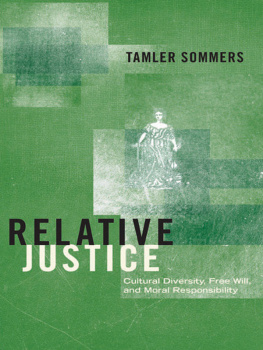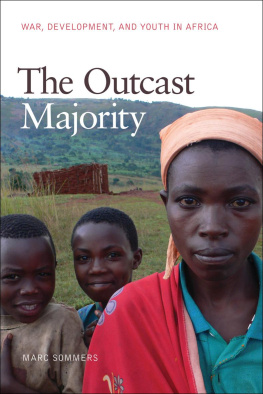Relative Justice
Relative Justice
CULTURAL DIVERSITY, FREE WILL, AND MORAL RESPONSIBILITY
Tamler Sommers
PRINCETON UNIVERSITY PRESS
PRINCETON AND OXFORD
Copyright 2012 by Princeton University Press
Published by Princeton University Press,
41 William Street, Princeton, New Jersey 08540
In the United Kingdom: Princeton University Press,
6 Oxford Street, Woodstock, Oxfordshire OX20 1TW
press.princeton.edu
All Rights Reserved
Library of Congress Cataloging-in-Publication Data Sommers, Tamler, 1970
Relative justice : cultural diversity, free will, and moral responsibility / Tamler Sommers.
p. cm.
Includes bibliographical references (p. ) and index.
ISBN 978-0-691-13993-7 (hardcover : alk. paper)
1. Responsibility-Cross-cultural studies. 2. Skepticism.
3. Ethics. I. Title.
BJ1451.S67 2012
170.42-dc22 2011014067
British Library Cataloging-in-Publication Data is available
This book has been composed in Minion Pro
Printed on acid-free paper.
Printed in the United States of America
10 9 8 7 6 5 4 3 2 1
For my father, Fred Sommers,
and for the memory of my mother, Shula Sommers
The statement, therefore, that men can be held responsible solely for individual conduct freely willed is certainly wrong; it mistakes a principal characteristic of individualistic ages for an eternal law of human nature.
Heinrich Gomperz, Individual, Collective, and Social Responsibility
CONTENTS
ACKNOWLEDGMENTS
The first time I presented a paper on this books thesis was at the Conference on Responsibility, Agency, and Persons at the University of San Francisco, organized by Manuel Vargas. I was one of six lucky junior philosophers to present, and each of us received extensive comments from an accomplished scholar or free will celebrity (as Manuel called them). John Martin Fischer, a free will celebrity by any standard, was my commentator and his criticisms helped to shape the project as it developed. hanks to John and so many of the other senior philosophers in our field for creating such a congenial and supportive environment. hanks also to Manuel for indulging me in several long conversations about issues in metaethics and the philosophy of language. Several key sections of the book have benefited tremendously from these discussions.
Shaun Nichols has offered important suggestions and much encouragement throughout the writing process. His own work has been a source of inspiration for many of the arguments and my general approach in this project. I am deeply grateful for his generosity, friendship, and support.
I owe a huge debt of thanks to Saul Smilansky for his extensive, in-depth comments on earlier drafts of this book. My arguments have been significantly refined and (I hope) improved as a result of his criticisms. Thanks also to Ron Mallon for valuable comments on an earlier draftand for helping me to curb my excessive use of abbreviations. And thanks to Derk Pere-boom for his important contributions during the early stages of this project, and for introducing me to the complex view of responsibility in the Old Testament.
Thanks to John Doris, Joshua Knobe, Michael McKenna, Eddy Nahmias, Stephen Stich, and Jonathan Weinberg for many helpful comments and suggestions about this project. I am also grateful to Steve Burks, and Mark Colliermy colleagues at the University of Minnesota, Morrisand to Bill Nelson, Dave Phillips, and Josh Weisberg at the University of Houston for valuable discussions on the books topic.
Many of the ideas in this book were floated on the free will blog The Garden of Forking Paths and its later incarnation Flickers of Freedom. The discussions that followed were enormously helpful and I am grateful for all of them. There are too many contributors on those blogs to name, but I would like to offer special thanks to Tom Clark and Thomas Nadelhoffer for their comments on my post [To Hell With] the TNR Principle, which I address in the final chapter of this book.
I am grateful to Rob Tempio, philosophy editor at Princeton University Press for his encouragement and advice at every stage of this process, and for finding such excellent reviewers. And much thanks to Eva Jaunzems for her fantastic work in the copyediting of this book.
Several passages and arguments have been adapted from my earlier work. Thanks to Philosophy Compass, Philosophy and Phe-nomenological Research, Biology and Philosophy, and the Philosophical Quarterly for allowing me to use that material here.
As always, I wish to express my love and gratitude to my wife Jennifer and my daughter Eliza for their support and encouragement, for making our house a pleasant place to work and, more importantly, a wonderful place to stop working. Finally, it breaks my heart to note that this will be the last project that was conceived, planned, shaped, and revised during long walks with Tess, the best dog anyone could ask for.
Houston, Texas
March 2011
Relative Justice
INTRODUCTION
METASKEPTICISM ABOUT MORAL RESPONSIBILITY
Just after the shootings at Virginia Tech University, a reporter for the National Public Radio program Day to Day set out to interview Koreans living in Los Angeles about the massacre. At first the reporter had trouble finding anyone who was willing to answer her questions. Some actually fled from the microphone. Finally, a Korean realtor agreed to be interviewed. He claimed to be deeply ashamed about the incident. The reporter was incredulous: Why? she asked him. You had nothing to do with it! The man replied, I know, but he was a fellow Korean.
In the same week Rev. Dong Sun Lim, founder of the Oriental Mission Church in Koreatown, released this statement: All Koreans in South Korea-as well as here-must bow their heads and apologize to the people of America. And South Korean Ambassador Lee Taesik called on Korean Americans not just to be ashamed, but to repent. He suggested a thirty-two-day fast, one day for each victim of the carnage.
Many Americans found this attitude baffling. Why should Koreans living thousands of miles away from Blacksburg, Virginia, feel compelled to apologize, never mind starve themselves, for something over which they had no control? What did they have to apologize for? Adrian Hong, a board member of the MiraeFoundation, a national organization of Korean-American college students, offers this explanation:
First-generation Koreans tend to have a cultural sense of shared responsibility. If something good happens to one, it happens to all Koreans, and if something bad happens to one, it happens to all of them.
UCLA anthropology professor Kyeyoung Park adds:
In Western culture there is an emphasis on guilt; in many Eastern cultures the emphasis is on shame. I think Korean-Americans want to do something [about the incident] because they feel ashamed. Some of them feel truly responsible, even though it is ridiculous to think they are responsible for the action of this person. (italics added)
The Koreans sense of shared blame, along with the failure of many Americans to understand it, is one example of variation in perspectives about moral responsibility across cultures. Many of these differences concern beliefs about the conditions or criteria for fair assignment of blame and praise. The incredulity of the Day to Day reporter-"But you had nothing to do with it!"-illustrates the common Western intuition that moral responsibility has a robust control condition: in order to be genuinely blameworthy for a state of affairs, you must have played an active role in bringing it about. This intuition is so deeply embedded in the Western individualistic belief system that it seems self-evident, like a mathematical truth or an elementary rule of logic. But like other intuitions and beliefs about moral responsibility, it is not nearly as universal as we might think.








